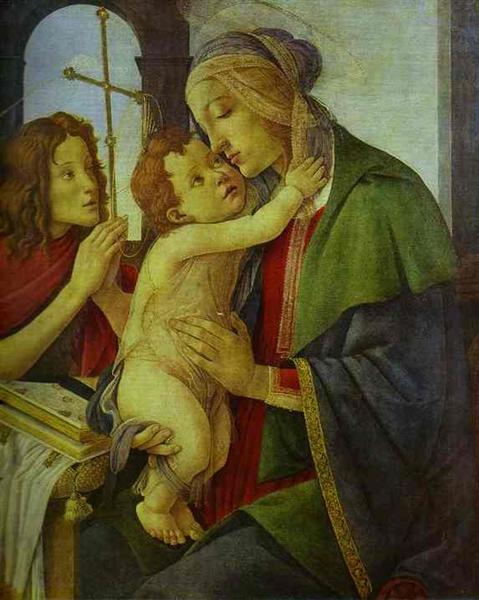Tanım
The painting "The Madonna and Child with the Infant Saint John" by Sandro Botticelli is a magnificent example of the Italian Renaissance, capturing the spirituality and humanity of its characters in a harmonious and fluid arrangement. This work, which probably dates back to the late 15th century, is part of the production of the Florentine master, famous for his ability to combine religious elements with a soft and melodic aesthetic.
At the centre of the composition we find the Virgin Mary, who tenderly holds the Infant Jesus. Botticelli manages to convey a deep emotional connection between the two, evidenced by Mary's expression, which denotes love and devotion, and the gesture of the Infant, who, with his innocent gaze, radiates purity. This maternal relationship is a recurring theme in the artist's work, who shows interest in the representation of affection and intimacy between sacred figures.
Next to Mary and the Child is the Infant Saint John the Baptist, theologically significant in Christian tradition as the precursor of Christ. His presence not only enriches the visual narrative, but also establishes a dialogue between the characters. Saint John is depicted in an active posture, with his body slightly turned towards the viewer, creating a direct and dynamic connection that invites contemplation. The way the Infant Jesus looks out at Saint John establishes a symbol of camaraderie and predestination.
Botticelli's composition is notable for its balanced triangular arrangement that provides stability to the painting. This use of geometry is characteristic of the Renaissance and reflects a classical ideal of proportion and harmony. The figures are arranged in such a way that the viewer's eyes are gently guided from one to the other, creating a visual bond that unites the three protagonists.
Colour is another vital element in this work. Botticelli uses a soft, light palette, with warm, earthy tones predominating, evoking a calm and reverent atmosphere. The luminosity emanating from the figures' fair skin suggests an almost ethereal quality, while the details in the clothing reflect the artist's meticulous attention to texture and nuance. The delicacy of the draping on Mary's garments, with her blue cloak and red tunic, contrasts with the simplicity of St John's attire, suggesting his role as an ascetic and humble figure compared to Jesus' mother.
Throughout the history of art, Botticelli's work has been a point of reference for both religious and aesthetic understandings. His style is distinguished by a fusion of spirituality and idealism, linking classicism with the mysticism characteristic of his time. Other similar works, such as "Primavera" or "The Birth of Venus", show the artist's ability to combine human beauty with moving mythological and religious elements.
"The Madonna and Child with the Infant Saint John" is a depiction that not only invites veneration, but also prompts reflection on the relationship between the divine and the human. Botticelli's mastery lies in his ability to blur the boundaries between these worlds, creating a work that resonates both in its formal beauty and its spiritual significance. The emotional richness of this painting remains a subject of admiration and study, revealing the timelessness of Renaissance art and the perennial relevance of its themes.
KUADROS ©, a famous painting on your wall.
Hand-made oil painting reproductions, with the quality of professional artists and the distinctive seal of KUADROS ©.
Painting reproduction service with satisfaction guarantee. If you are not completely satisfied with the replica of your painting, we will refund 100% of your money.

